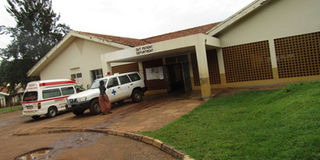Medics left to operate with torches, candles

Desperate. The Outpatient Department at Tororo Hospital which has been hit by power blackout. PHOTO BY JOSEPH OMOLLO
What you need to know:
- The district has reportedly failed to clear the outstanding electricity arrears, which have been accruing since 2013.
- As a result, the blackout has affected service delivery especially in times of emergencies and left staff who work at night at risk.
Power disconnection to Tororo main hospital has left doctors and nurses with only torches and candles to attend to patients in the night.
Power distribution company Umeme disconnected the facility over unpaid power bills totalling Shs76 million, leaving the 1500-bed capacity hospital in darkness for the last two weeks.
The government hospital serves the entire Bukedi region, part of neighbouring Mbale District, and Western Kenya.
The hospital administrator, Mr Walter Oryekwun, said: “Operations at the hospital have been paralysed because it’s has become difficult to offer services at night, especially emergencies.”
He said handling emergency situations, especially caesarean deliveries, have been frustrated.
Mr Oryekwun said most of the vaccines, blood and other medicines that need to be stored in cool temperatures are on the verge of getting wasted.
“The Umeme officials should have given us more time but the decision they took was inhuman. It’s my appeal that they should consider the plight of the patients when executing their duties because this is a government institution and it’s going nowhere,” he said.
Mr Oryekwun said they also fear for the safety of the staff on night duty, the patients and their attendants.
Tororo District has reportedly failed to clear the outstanding electricity arrears, which have been accruing since 2013.
Unavailability
The hospital administrator, Mr Walter Oryekwun, said although development partners, including the Institute for Disease Research Centre, Global Health, and Taso have improvised standby generators to run the refrigerators, the power is unreliable.
“As an institution, we do not have alternative sources to undertake any maintenance, servicing or repairs of the generators basing on our resource envelope,” Mr Oryekwun said.
He appealed to government to consider increasing the Primary Health Care allocation for public health faculties basing on the current coverage.
One of the health workers, who preferred anonymity, said the situation is pathetic and has forced them to use candles and torches at night.
Ms Sarah Adikin, who has a sick daughter admitted of Malaria at the hospital, said: “I have been forced to stay at the facility because of the condition of my daughter, otherwise, I couldn’t stay in such a dark place.”
She said the blackout is also putting the lives of patients and attendants, especially females, at risk of being raped or their properties being stolen.
The chief administrative officer, Ms Elizabeth Namanda, said they have already engaged with ministries of Health and Finance to intervene.
“The situation has been made worse due to none operations of the district council, otherwise, we would have called an emergency council meeting to come up with a minute of borrowing but this is not possible now because the councillors are divided on tribal lines,” she said.
The acting district council chairperson, Ms Stella Imukutet, said her office has instructed chief administrative officer to ensure emergencies are handled, even if it requires borrowing.
Umeme speaks out
The manager of Umeme branch in Tororo, Ms Doreen Ogebga, said they took the decision after the district authorities became adamant to their reminders.
“We might be blamed for taking the decision, but we did it after several engagements with the hospital authorities from 2016 and we were not getting any response,” she said.
She said last year, they had a meeting and agreed that the district commits at least half of the money demanded, but nothing has materialised.



